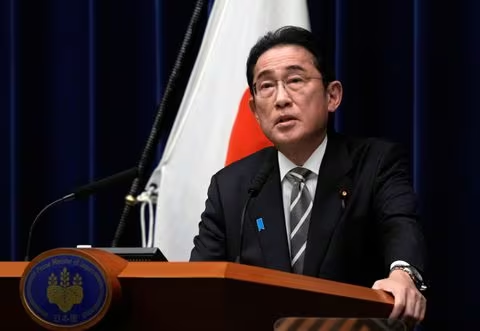Japan's political scandal may clear path for easy policy exit
Japan's political landscape is undergoing a significant shift due to a fundraising scandal, potentially paving the way for a smoother exit from ultra-low interest rates by the Bank of Japan (BOJ). Prime Minister Fumio Kishida has announced cabinet changes in response to the scandal, which has eroded public support for his administration.
The timing is critical for the BOJ, which has been planning an exit from ultra-low interest rates amid rising inflation and indications of broader wage increases. Most market observers anticipate the end of Japan's negative rates sometime in the coming year.
Historically, the "Seiwa-kai" or "Abe faction," once led by the late Shinzo Abe, wielded substantial influence in policymaking, favoring substantial fiscal and monetary stimulus. However, the ongoing political upheaval is expected to sideline key figures, including heavyweight Hiroshige Seko, known for advocating large fiscal spending and a preference for an ultra-loose policy stance.
While the BOJ operates independently in determining monetary policy, political pressure has historically played a significant role in influencing its decisions. The departure of influential figures from the Abe faction is anticipated to give Governor Kazuo Ueda more autonomy in guiding policy.
Despite potential advantages for the BOJ, Kishida's administration's weakened position could hinder effective collaboration between the government and the central bank for a major policy shift. Some close to Kishida indicate support for Governor Ueda's efforts to phase out the previous radical stimulus, criticized for impacting imported goods prices and households' living costs through a weakened yen.
Former BOJ official Shigeto Nagai suggests that with the diminishing influence of the Abe faction, calls for an ultra-loose monetary policy to complement expansive fiscal measures may diminish. However, there is uncertainty about how the political turmoil might affect the timing of an exit from negative rates.
Analysts caution that the political uncertainty may lead to policy paralysis, potentially delaying crucial negotiations between the BOJ and the government to ensure a smooth transition from easy monetary policy without destabilizing markets and the economy.
Political analyst Atsuo Ito notes that the focus is now on how long the Kishida administration can endure, given its current weakened state. Despite challenges, some analysts believe the BOJ could find a clearer path to an exit from low rates, with predictions that the bank may end negative rates as early as January, as the influence of politicians on guiding policy diminishes.

.png)
Comments
Post a Comment